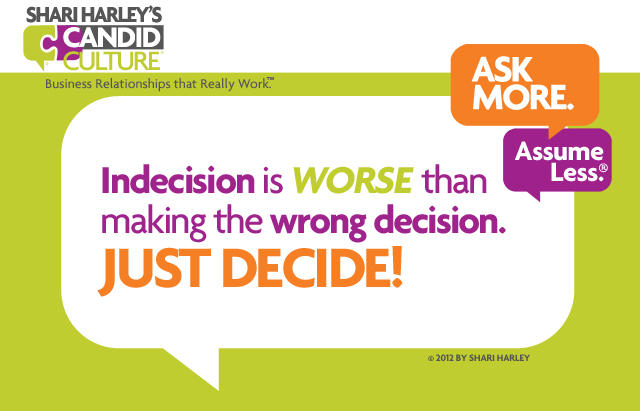Indecision plagues many of us at work.
- Hire the person or source additional candidates?
- Let the employee go or keep him?
- Launch the software implementation or wait?
- Gather more technical requirements or move forward with the information you have?
- Ask for different responsibilities or look for a job?
- Announce upcoming organizational changes to all employees or just to the leadership team?
We meet and discuss, meet some more, discuss some more, and still don’t decide. Endless meetings, discussions, and indecision exhausts and discourages employees and costs money.

Do your due diligence:
- involve the people closest to the work in making the decision;
- gather enough information to make an informed decision;
- get key stakeholders’ buy in;
- then decide and act.
And if it’s the wrong decision you’ll know soon enough and can course correct.
The indecision is often worse than making the wrong decision. My friend and colleague Steve Shapiro author of Goal Free Living would say that the only wrong decision is not making one.
But we know there are decisions that have negative consequences, which is why we’re often hesitant to make decisions. If we make the wrong decision families, careers, and companies are impacted.
So we wait and discuss, dialogue, and debate, over and over and over. Follow the steps above regarding due diligence and decide. Don’t wait too long or stay too long. It’s not good for anyone, especially you.

If you read your organization’s handbook carefully you will see, in the very fine print, the rule stating that there will be three people in your organization who no one can work with. Everyone knows who these people are. They are the people who employees are afraid of, who tend to make others’ lives hard, and who no one wants to work for.
Employees wonder, doesn’t anyone in management know about these people? Why isn’t anyone DOING anything? Someone is most likely doing something. Dealing with difficult coworkers just take time to work themselves out. And managers can’t talk about others’ performance with you, as you wouldn’t want them talking about your performance with others.
What to do in the face of a crazymaker who doesn’t appear to be going anywhere?
Crazymakers are often bullies and bullies push the people around who let them do so. Despite your fear, give it right back to a bully. Chances are she will back off and find someone else to pick on. Do this professionally. Don’t compromise your own reputation by interacting with a bully in the way she interacts with you.
Work around the person. I’m not giving you a pass to avoid the people you don’t like working with. If you have done everything you can to work well with someone and he won’t work with you, do your minimal best. Be polite and respectful. Keep the person in the loop when necessary. But don’t go out of your way to nurture the relationship. You can’t work with someone who won’t work with you.
Doing everything to work well with someone includes talking to the person about your working relationship, admitting it’s strained, and asking for feedback about what would improve the relationship. Doing everything might involve getting a third party or outside mediator to broker a conversation. It might include weekly meetings to ensure regular communication. If you’ve tried ALL of these things with no outcome, then you can work around the person. But everything is NOT, “I sent three emails and didn’t hear back.”

You can leave your organization to avoid the person who makes you crazy, but s/he will be waiting for you at the next company in a different body.
If you like the work you’re doing and, for the most part, like where you work, don’t let dealing with difficult coworkers drive you from the organization. Ask for help. Let someone who can do something about the situation, assist you or at least give you the go ahead to work around that person, when possible. And if the situation becomes untenable, before you resign, tell someone in a position of formal authority that you’re at the end of your rope and you’re planning to leave. If something is going to change in the short term, he or she will often know and tell you.





